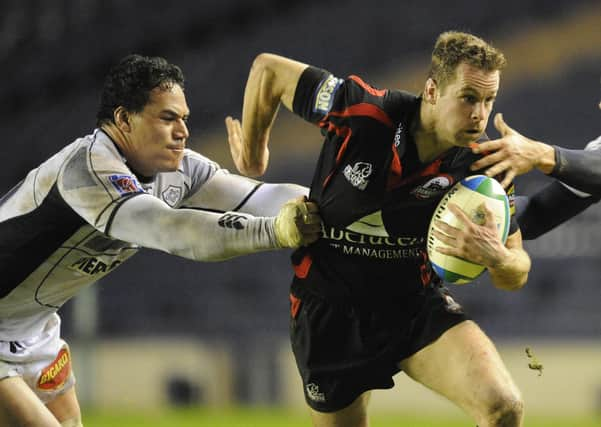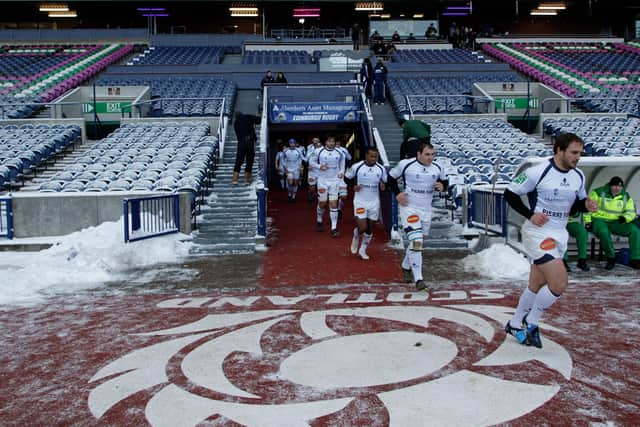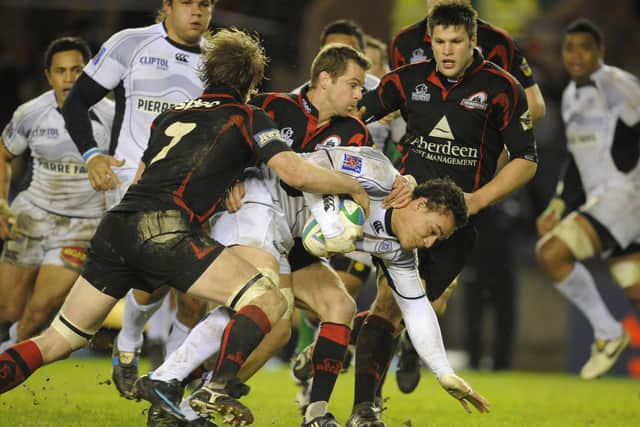Chris Paterson remembers when Edinburgh met Castres in front of an empty Murrayfield


It was in December 2010 that the highly-decorated full-back featured with Edinburgh against Castres in an eerily empty Murrayfield Stadium.
The hastily-rearranged Heineken Cup fixture took place on a bitterly cold Monday afternoon after originally being postponed from the day before due to a freak snow storm.
Advertisement
Hide AdAdvertisement
Hide Ad“As a goalkicker you learn to shut everything out,” recalled Paterson, to The Yorkshire Post.


“You prepare for all eventualities; people making noise, people not making noise, someone saying something to you from the front row of the crowd... you deal with all sorts.
“But I remember kicking a goal that day and coming across something I’d never prepared for. It always makes me chuckle. I was lining up and heard this noise which left me wondering ‘what is that?’
“You don’t usually hear stuff as it’s usually a wall of noise or you’re purely focused. But it was so quiet that I could actually hear one of the ground staff chipping ice off the stairs at the back of the stadium with a shovel!
Advertisement
Hide AdAdvertisement
Hide Ad“It truly is not anything I ever thought I’d need to prepare for in a game of rugby…”


Although historically there are numerous instances of playing behind closed doors in football, normally in relation to sanctions imposed on clubs due to rioting fans or pitch invasions, it is rare in rugby. However, learning to play with no fans watching is something all sports are quickly getting used to after lockdown.
Football, cricket, rugby league and even snooker, of course, have already begun while it is union’s turn this coming weekend when Harlequins host Sale on Friday as the Premiership resumes.
Clearly, it will initially be a strange experience in these Covid-19 times but Paterson – Scotland’s record points scorer and their first player to reach 100 caps – believes players will soon adapt.
Advertisement
Hide AdAdvertisement
Hide AdHow did he deal with the situation in 2010 in a huge ground which often houses 70,000 people?
“This sounds terrible – I can caveat it with being the way I prepared for any game – but I’d shutdown one way or another whatever,” he said, Edinburgh eventually beating the French side 24-22.
“If it was a full stadium or empty, I didn’t really allow the atmosphere to affect me. It’s probably easier to do that when it’s full rather than empty, if that makes sense, because it’s so different to what you usually play in.
“But I don’t think it affected my performance; when you’re in the moment and asked to make a tackle, make a kick, make a decision, instinctively you do that, focusing purely on the job in hand.
Advertisement
Hide AdAdvertisement
Hide Ad“Maybe coming out after half-time or when the ball was out of play it was different but that’s all.”
Paterson, 42, now works as a specialist kicking coach and ambassador for Scottish Rugby. The Pro14 restarts on August 22.
Although Edinburgh’s game in 2010 was a one-off occurrence, rugby players must now get used to weeks of playing in front of empty, soulless stadiums. Inevitably, it begs the question about whether they will still be able to rise to the occasion although, conversely, some players may thrive with less piercing pressure bearing down on them from the stands. Paterson, who played in four World Cups before retiring in 2012 , agreed: “Potentially yes. “I played with so many different people throughout my career. Some loved big crowds, some worried about big crowds, some couldn’t perform without big crowds or felt they needed those fans to inspire them. “I don’t think there’ll be a one answer fits all but players now are so able to adapt. “It will be strange for them and they will need a coping mechanism to do that. “But coaches might come up with some innovative ideas as well. How will they train, do they record noise and do coaches pick up audio in the field which will help them work out who the great communicators are? “I do think players can adapt to almost anything but it will give them a huge appreciation for when the fans are back in. “That should be there already but, if it isn’t, it will be after this.” Looking back to that Heineken Cup fixture, Paterson - working again after furlough - said: “I was having a pre-match meal at home about three hours before kick-off and the snow started to come on. “There was snow forecast and I thought ‘here we go, a snowy afternoon and freezing cold.’ “But by the time I got to Murrayfield - which was only 20 minutes away - it was getting heavier and heavier. “Within an hour, it was so deep, no one could get anywhere and there was no way we could play. “The undersoil heating had no time to be effective because it had come down so quick. It was just like a white-out and two or three feet deep. “The game was postponed but it had to be played within 24 hours and, with it not being safe for fans to travel, that’s why it went ahead on the Monday afternoon behind closed doors. “It was the coldest I’ve ever been about minus ten or 12. “There was a small group of Castres fans who had travelled all that way but weren’t allowed in the stadium. We felt pretty sorry for them. “It was a fairly uneventful game in the end. We just wanted to get it on and won.”
Editor’s note: first and foremost - and rarely have I written down these words with more sincerity - I hope this finds you well.
Advertisement
Hide AdAdvertisement
Hide AdAlmost certainly you are here because you value the quality and the integrity of the journalism produced by The Yorkshire Post’s journalists - almost all of which live alongside you in Yorkshire, spending the wages they earn with Yorkshire businesses - who last year took this title to the industry watchdog’s Most Trusted Newspaper in Britain accolade.
And that is why I must make an urgent request of you: as advertising revenue declines, your support becomes evermore crucial to the maintenance of the journalistic standards expected of The Yorkshire Post. If you can, safely, please buy a paper or take up a subscription. We want to continue to make you proud of Yorkshire’s National Newspaper but we are going to need your help.
Postal subscription copies can be ordered by calling 0330 4030066 or by emailing [email protected]. Vouchers, to be exchanged at retail sales outlets - our newsagents need you, too - can be subscribed to by contacting subscriptions on 0330 1235950 or by visiting www.localsubsplus.co.uk where you should select The Yorkshire Post from the list of titles available.
If you want to help right now, download our tablet app from the App / Play Stores. Every contribution you make helps to provide this county with the best regional journalism in the country.
Sincerely. Thank you.
James Mitchinson
Editor
Comment Guidelines
National World encourages reader discussion on our stories. User feedback, insights and back-and-forth exchanges add a rich layer of context to reporting. Please review our Community Guidelines before commenting.